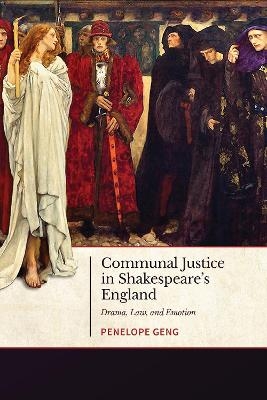
Communal Justice in Shakespeare's England
Drama, Law, and Emotion
Seiten
2021
University of Toronto Press (Verlag)
978-1-4875-0804-3 (ISBN)
University of Toronto Press (Verlag)
978-1-4875-0804-3 (ISBN)
Providing a fresh examination of the relationship between literary and legal communities, Communal Justice in Shakespeare’s England examines the literature of the communal justice in early modern England.
The sixteenth century was a turning point for both law and drama. Relentless professionalization of the common law set off a cascade of lawyerly self-fashioning – resulting in blunt attacks on lay judgment. English playwrights, including Shakespeare, resisted the forces of legal professionalization by casting legal expertise as a detriment to moral feeling. They celebrated the ability of individuals, guided by conscience and working alongside members of their community, to restore justice. Playwrights used the participatory nature of drama to deepen public understanding of and respect for communal justice. In plays such as King Lear and Macbeth, lay people accomplish the work of magistracy: conscience structures legal judgment, neighbourly care shapes the coroner’s inquest, and communal emotions give meaning to confession and repentance.
An original and deeply sourced study of early modern literature and law, Communal Justice in Shakespeare’s England contributes to a growing body of scholarship devoted to the study of how drama creates and sustains community. Penelope Geng brings together a wealth of imaginative and documentary archives – including plays, sermons, conscience literature, Protestant hagiographies, legal manuals, and medieval and early modern chronicles – proving that literature never simply reacts to legal events but always actively invents legal questions, establishes legal expectations, and shapes legal norms.
The sixteenth century was a turning point for both law and drama. Relentless professionalization of the common law set off a cascade of lawyerly self-fashioning – resulting in blunt attacks on lay judgment. English playwrights, including Shakespeare, resisted the forces of legal professionalization by casting legal expertise as a detriment to moral feeling. They celebrated the ability of individuals, guided by conscience and working alongside members of their community, to restore justice. Playwrights used the participatory nature of drama to deepen public understanding of and respect for communal justice. In plays such as King Lear and Macbeth, lay people accomplish the work of magistracy: conscience structures legal judgment, neighbourly care shapes the coroner’s inquest, and communal emotions give meaning to confession and repentance.
An original and deeply sourced study of early modern literature and law, Communal Justice in Shakespeare’s England contributes to a growing body of scholarship devoted to the study of how drama creates and sustains community. Penelope Geng brings together a wealth of imaginative and documentary archives – including plays, sermons, conscience literature, Protestant hagiographies, legal manuals, and medieval and early modern chronicles – proving that literature never simply reacts to legal events but always actively invents legal questions, establishes legal expectations, and shapes legal norms.
Penelope Geng is an assistant professor in the Department of English at Macalester College.
List of Illustrations
Note on Texts
Abbreviations
Preface
Introduction: A Double Obligation
1. From Assise to the Assize at Home
2. Judicature in Crisis: Henry IV, Part 2
3. Neighbourliness and the Coroner’s Inquest in English Domestic Tragedies
4. Repairing Community: Empathetic Witnessing in Acts and Monuments and King Lear
5. Communal Shaming and the Limitations of Legal Forms: Henry VI, Part 2 and Macbeth
Postscript
Acknowledgments
Bibliography
| Erscheinungsdatum | 10.05.2021 |
|---|---|
| Zusatzinfo | 9 b&w illustrations |
| Verlagsort | Toronto |
| Sprache | englisch |
| Maße | 159 x 235 mm |
| Gewicht | 520 g |
| Themenwelt | Literatur ► Lyrik / Dramatik ► Dramatik / Theater |
| Geisteswissenschaften ► Sprach- / Literaturwissenschaft ► Anglistik / Amerikanistik | |
| Geisteswissenschaften ► Sprach- / Literaturwissenschaft ► Literaturgeschichte | |
| Geisteswissenschaften ► Sprach- / Literaturwissenschaft ► Literaturwissenschaft | |
| ISBN-10 | 1-4875-0804-2 / 1487508042 |
| ISBN-13 | 978-1-4875-0804-3 / 9781487508043 |
| Zustand | Neuware |
| Informationen gemäß Produktsicherheitsverordnung (GPSR) | |
| Haben Sie eine Frage zum Produkt? |
Mehr entdecken
aus dem Bereich
aus dem Bereich


